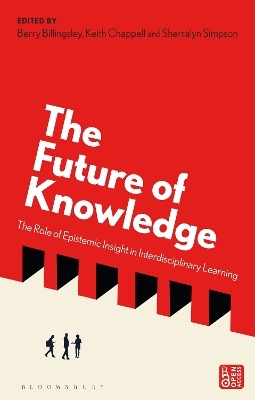
The Future of Knowledge
Bloomsbury Academic (Verlag)
978-1-350-38390-6 (ISBN)
How do we know what to trust in an online world rife with misinformation?
How can we confront our mental health crises?
How can we overcome polarization on issues of critical importance to our shared existence?
How can we work together with those who see the world differently to us?
Confronting these questions requires us to consider what the ‘future of knowledge’ might be, including the distinctive roles that disciplines across the sciences, arts and humanities might play. Epistemic insight is the ‘knowledge about knowledge’ needed to navigate the similarities and differences between disciplines and how they approach these questions differently. However, many education systems operate with a compartmentalized structure that limits the development of epistemic insight and thus our ability to provide students with the ‘knowledge about knowledge’ they need.
This open access book draws from 10 years of research into how epistemic insight can transform compartmentalized structures of learning. It presents a range of strategies and approaches for how educators, including schoolteachers, teacher educators, lecturers and education policy-makers, can facilitate epistemically insightful educational experiences. This book provides a distinctive contribution to the field of inter/multi/transdisciplinary education and will be of interested to anyone exploring the power and potential of these approaches.
The ebook editions of this book are available open access under a CC BY-NC-ND 4.0 licence on bloomsburycollections.com. Open access was funded by Templeton World Charity Foundation (TWCF).
Berry Billingsley is Professor of Science Education at Canterbury Christ Church University, UK. Keith Chappell is a Research Fellow at the LASAR Centre at Canterbury Christ Church University, UK. Sherralyn Simpson is a Research Fellow and Primary Schools Lead at the LASAR Centre at Canterbury Christ Church University, UK.
List of Teacher Resources and Notes
List of Contributors
Preface: The Future of Knowledge, Berry Billingsley, Keith Chappell, and Sherralyn Simpson
Foreword, Renato Opertti
Introduction: Creating the Future of Knowledge in the age of Gen AI, Berry Billingsley
Chapter Summaries and How to Read this Book, Keith Chappell, Berry Billingsley and Sherralyn Simpson
Part I: Epistemic insight, epistemic agency and multidisciplinary enquiries
Statement of Support, Alona Forkosh Baruch
1. Cultivating Epistemic Agents as Critical Consumers of Information, Berry Billingsley and Sean Durbin
Part II: Planning to Teach with Big Questions
Statement of support, Overson Shumba
2. Igniting primary school students’ curiosity: Exploring the impact of co-created Epistemic Insight teaching on learner agency, Sherralyn Simpson
3. Big Questions about humanity’s place in the cosmos and Epistemic Insight pedagogy among university trainee teachers, Maureen Kanchebele Sinyangwe
4. Big Questions – and their value in extra-curricular activities that teach epistemic insight, Laura Hackett
Part III: What is the Epistemic Insight Future of Knowledge Initiative?
Statement of Support, Richard Cheetham
5. Future Libraries AI Focusing on Motivations to Learn: A Technologist’s View, Ted Selker with additional creative input and expert knowledge from Berry Billingsley
6. Research Co-Creation and the Development of Epistemically Insightful Curricula, Finley I. Lawson, Mandy Dhaliwal, Michelle Lawson and Henry Coates
7. How can we educate future generations to effectively respond to global challenges and live sustainably? Developing agentic learners through an epistemically insightful curriculum, Agnieszka J. Gordon and Sherralyn Simpson
Part IV: The Future of Knowledge and Higher Education
Statement of Support, Rama Thirunamachandran
8. Dancing with the Digital: An ‘EI’ workshop designed to bridge disciplines and spark students’ epistemic creativity, Lee Hazeldine, Karl Bentley, Angela Pickard and Allan Callaghan
9. The Nature-Knowledge-Values framework – a pedagogical tool for teaching NOS in tertiary Education, Klaus Colanero and Kai Ming Kiang
Part V: Language, Technology and Inclusivity
Statement of Support, John Bryant
10. Building a Smarter Search Engine, Aryn Litchfield
11. A Sociocultural Understanding of Epistemic Insight: Toward an Imperative of Interdisciplinary Teaching and Learning, Dana L. Zeidler
12. Get ready, steady, allez? ¡Vamos!, Martin Pickett
Part VI: Science, Imagination, Interdisciplinarity and AI
Statement of Support, Nidhal Guessoum
13. Science Education, Interdisciplinarity, and Critical thinking, Nidhal Guessoum
14. Philosophy and Artificial friends, Greg Artus
15. Library Perspective: closing the book, continuing to grow…, Keith Chappell
16. Teacher Notes and Resources
Index
| Erscheinungsdatum | 24.09.2024 |
|---|---|
| Zusatzinfo | 20 bw illus |
| Verlagsort | London |
| Sprache | englisch |
| Maße | 138 x 216 mm |
| Themenwelt | Sozialwissenschaften ► Pädagogik ► Allgemeines / Lexika |
| Sozialwissenschaften ► Pädagogik ► Bildungstheorie | |
| Sozialwissenschaften ► Pädagogik ► Erwachsenenbildung | |
| ISBN-10 | 1-350-38390-2 / 1350383902 |
| ISBN-13 | 978-1-350-38390-6 / 9781350383906 |
| Zustand | Neuware |
| Haben Sie eine Frage zum Produkt? |
aus dem Bereich


